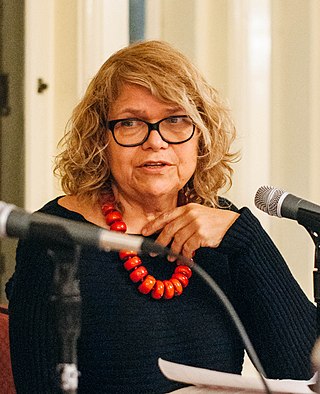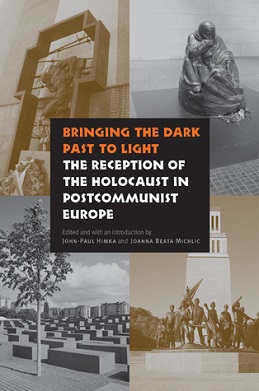Related Research Articles

The Jedwabne pogrom was a massacre of Polish Jews in the town of Jedwabne, German-occupied Poland, on 10 July 1941, during World War II and the early stages of the Holocaust. Estimates of the number of victims vary from 300 to 1,600, including women, children, and elderly, many of whom were locked in a barn and burned alive.
Marek Jan Chodakiewicz is a Polish-American historian specializing in Central European history of the 19th and 20th centuries. He teaches at the Patrick Henry College and at the Institute of World Politics. He has been described as conservative and nationalistic, and his attitude towards minorities has been widely criticized.
Żydokomuna is an anti-communist and antisemitic canard, or a pejorative stereotype, suggesting that most Jews collaborated with the Soviet Union in importing communism into Poland, or that there was an exclusively Jewish conspiracy to do so. A Polish language term for "Jewish Bolshevism", or more literally "Jewish communism", Żydokomuna is related to the "Jewish world conspiracy" myth.

The Kraków pogrom was the first anti-Jewish riot in post World War II Poland, that took place on 11 August 1945 in the Soviet-occupied city of Kraków, Poland. The incident was part of anti-Jewish violence in Poland towards and after the end of World War II. The immediate cause of the pogrom was a blood libel rumour of a ritual murder of Polish children by Jews in the city. A false allegation that a child had been abducted by a Jewish woman had grown to allegations that Jews had killed up to 80 children over the course of weeks. These allegations led to attacks on Jews, as well as some Poles mistaken for Jews, in the Kazimierz quarter, and other parts of the Old Town, and the burning of the Kupa Synagogue. At least one person was killed and an unknown number were injured.

The Lviv pogroms were the consecutive pogroms and massacres of Jews in June and July 1941 in the city of Lwów in German-occupied Eastern Poland/Western Ukraine. The massacres were perpetrated by Ukrainian nationalists, German death squads (Einsatzgruppen), and urban population from 30 June to 2 July, and from 25 to 29 July, during the German invasion of the Soviet Union. Thousands of Jews were killed both in the pogroms and in the Einsatzgruppen killings.

Ryszard Janusz Bender was a Polish right-wing politician and historian. He is noted for his characterization of Auschwitz as a "labour camp", attracting allegations of Holocaust denial.

Neighbors: The Destruction of the Jewish Community in Jedwabne, Poland is a book published in 2000 written by Princeton University historian Jan T. Gross exploring the July 1941 Jedwabne massacre committed against Polish Jews by their non-Jewish neighbors in the village of Jedwabne in Nazi-occupied Poland.
The anti-Jewish violence in Central and Eastern Europe following the retreat of Nazi German occupational forces and the arrival of the Soviet Red Army – during the latter stages of World War II – was linked in part to postwar anarchy and economic chaos exacerbated by the Stalinist policies imposed across the territories of expanded Soviet republics and new satellite countries. The anti-semitic attacks had become frequent in Soviet towns ravaged by war; at the marketplaces, in depleted stores, in schools, and even at state enterprises. Protest letters were sent to Moscow from numerous Russian, Ukrainian and Belarusian towns by the Jewish Anti-Fascist Committee involved in documenting the Holocaust.

Polish Jews were the primary victims of the Nazi Germany-organized Holocaust in Poland. Throughout the German occupation of Poland, Jews were rescued from the Holocaust by Polish people, at risk to their lives and the lives of their families. According to Yad Vashem, Israel's official memorial to the victims of the Holocaust, Poles were, by nationality, the most numerous persons identified as rescuing Jews during the Holocaust. By January 2022, 7,232 people in Poland have been recognized by the State of Israel as Righteous among the Nations.

The Holocaust in Belarus refers to the systematic extermination of Jews living in the Byelorussian Soviet Socialist Republic during its occupation by Nazi Germany in World War II. It is estimated that roughly 800,000 Byelorussian Jews were murdered during the Holocaust. However, other estimates place the number of Jews killed between 500,000 and 550,000.

Antony Barry Polonsky is Emeritus Professor of Holocaust Studies at Brandeis University. He is the author of many historical works on the Holocaust, and is an expert on Polish Jewish history.

Anna Bikont is a Polish journalist for the Gazeta Wyborcza newspaper in Warsaw. She is the author of several books, including My z Jedwabnego (2004) about the 1941 Jedwabne pogrom, which was published in English as The Crime and the Silence: Confronting the Massacre of Jews in Wartime Jedwabne (2015). The French edition, Le crime et le silence, won the European Book Prize in 2011.
Joshua D. Zimmerman holds the Eli and Diana Zborowski Professorial Chair in Holocaust Studies and East European Jewish History at Yeshiva University. He is the author or editor of several works about the Holocaust, including Contested Memories. Poles and Jews during the Holocaust and Its Aftermath (2003) and The Polish Underground and the Jews, 1939–1945 (2015).
Yevhen Nakonechny was a Ukrainian historian, librarian, library scientist, linguist, and a teenage prisoner of the Soviet Gulag forced labour camp system during postwar Stalinist period for his involvement with the Organization of Ukrainian Nationalists (OUN).

Hunt for the Jews: Betrayal and Murder in German-Occupied Poland is a 2013 book about the Holocaust in Poland by Jan Grabowski. The 2013 English edition followed a 2011 Polish-language edition and was in turn followed by a 2016 Hebrew edition.

Ewa Kurek is a Polish historian specializing in Polish-Jewish history during World War II. She has been associated with the far-right, and her revisionist views regarding the Holocaust in Poland have been widely categorized as indicative of antisemitism and Holocaust denial.
The historiography of the Holocaust in Slovakia has been a much-debated subject, and historians have still not arrived at a consensus position as to the role of the Slovak State in the Holocaust.

Bringing the Dark Past to Light: The Reception of the Holocaust in Postcommunist Europe (2013) is a collection of twenty essays about the reception of the Holocaust in history and memory in various post-Communist countries. There is a different essay on each country. The book received mostly favorable reviews.

The Crime and the Silence: Confronting the Massacre of Jews in Wartime Jedwabne is a 2004 book by Polish journalist Anna Bikont on the Jedwabne massacre, a 1941 pogrom of Polish Jews in Jedwabne, German-occupied Poland. It was translated to French in 2011 and English in 2015. It received the European Book Prize in 2011.

The program of the Polish Law and Justice (PiS) party has chapters on "identity" (tożsamość) and "history policy". The implementation of the PiS history policy consists in promoting, in Poland and internationally, a version of history based on a policy of memory that focuses on protecting the "good name" of the Polish nation.
References
- ↑ Michlic, Joanna Beata (2000). "Ethnic nationalism and the myth of the threatening other: The case of Poland and perceptions of its Jewish minority from the late nineteenth century to the modern period". Doctoral thesis, University of London, p. 3.
- ↑ "Dr Joanna Beata Michlic". Centre for Collective Violence, Holocaust and Genocide Studies. University College London.
- 1 2 "Dr Joanna Michlic". University of Bristol. Archived from the original on 24 May 2015.
- ↑ Weinbaum, Laurence (Spring 2008). "Review: The Power of Hate". Jewish Political Studies Review. 20 (1/2): 134–137. JSTOR 25834783.
- 1 2 "Dr. Joanna B. Michlic — Project Director". Hadassah-Brandeis Institute. Archived from the original on 4 June 2013.
- ↑ "Michlic, Joanna Beata". EThOS.
- ↑ "Joanna Michlic". United States Holocaust Memorial Museum.
- ↑ "Past Research Fellows". Yad Vashem.
- ↑ "Project on Families, Children and the Holocaust". Hadassah-Brandeis Institute.
- ↑ Shneer, David (Fall 2014). "Reviewed Work: Bringing the Dark Past to Light: The Reception of the Holocaust in Postcommunist Europe by Ed. John-Paul Himka and Joanna Beata Michlic". Slavic Review. 73 (3): 653–655. doi:10.5612/slavicreview.73.3.653.
- ↑ Gunter, Joel (3 February 2018). "Holocaust law wields a 'blunt instrument' against Poland's past". BBC News.
- ↑ "Joanna Michlic". Fulbright Scholar Program.
- ↑ Maltz, Judy (18 June 2014). "Holocaust Study Debunks Myth of 'Ungrateful Jew'". Haaretz.